Chim Chim Cheree
As the weather turns colder we may consider staying in in front of the fire. These days most of us probably have the convenience of central heating, although lately wood burning stoves have become popular. However, some of us have an open fire for a treat and sit around toasting muffins and remembering our younger days – my parents installed central heating when I was six, but my grandmother had only an open fire until the mid 1980s! The treat is short lived when, the following morning, the grate has to be cleaned out and as the soot gets everywhere we wonder when the chimney was last swept. It is then that we should spare a though for the climbing boys of yesteryear.
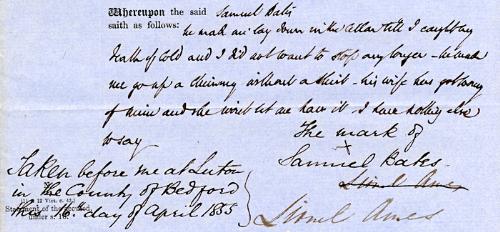
Our document of the month this time, QSR1855/3/5/3, is the deposition of Samuel Bates, aged 12. Samuel worked as a chimney sweep for James Odell of Luton but on the 5 April 1855 he decided he had had enough and absconded taking the tools of his trade, a cloth, brush and scraper, with him. The following day Odell quickly traced Samuel to the home of another chimney sweep, Henry Wesley of Hitchin, and handed him over to the police charged with the theft of the tools. In his defence Samuel complained that Odell "made me lay down in the cellar till I caught my death of cold and did not want to stop any longer. He made me go up a chimney without a shirt." Presumably he either knew or believed that Wesley would treat him more kindly.
Unfortunately the poor treatment of climbing boys was not uncommon. A report to Parliament in 1817 claimed they often suffered from general neglect. Since the late 18th century there had been attempts to regulate chimney sweeps introducing age and other conditions of employment but these were largely ignored. The Chimney Sweepers Act of 1834 supposedly restricted master sweeps to employing children over the age of 14 and the 1840 act increased this to 21. However, as we see, Samuel was much younger and he was not alone; at the Easter Quarter Sessions 1854 another 12 year-old chimney sweep, Isaiah Bull of Carlton, was convicted [ref: QSR1854/2/6/10].
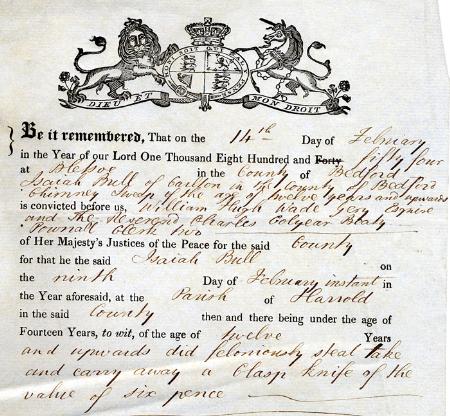
Climbing boys were classed as apprentices and from the early 19th century master sweeps were restricted in the number of apprentices they could have. P43/14/4 and P49/14/11 are apprenticeship indentures for poor boys from Ridgmont and Husborne Crawley respectively. By them George Warner aged 11 becomes the third apprentice to John Bowers of Bedford in 1809 and, in 1813, James Taylor aged 9 ½ becomes Bowers' fourth apprentice. We can see here how the indenture tried to ensure reasonable conditions for the boys. [ref: P49/14/11 x3]
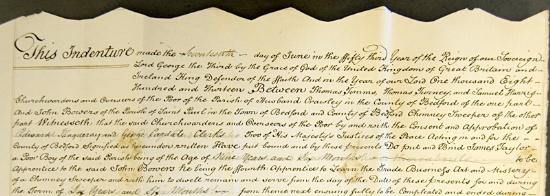


However, the designation as apprentice was questioned as the only skill taught was that of climbing chimneys, which did not lead to future employment. We see evidence of this in some other settlement records. In 1784 George Holmes declares that he was apprenticed at the age of 5 for 13 years, at the end of his apprenticeship he became a soldier [ref: P30/13/4/9]. The son of Ann and John Newman worked for his father as a sweep until he was about 19 and then had various jobs all lasting less than a year [ref: P5/13/4/19]. In 1821 John Warner (brother of George Warner mentioned above) explained that he had been apprenticed at the age of 9 to John Bowers for 7 years. He served his whole time and about 19 weeks beyond before pursuing a career as a footman to various employers in London [ref: PUBZ3/5 p164-167]. Unfortunately his statement is taken when he is a prisoner in Bedford gaol charged with stealing fowls and sentenced to 7 years transportation. From the gaol register we find that the 25 year-old John is only 5 feet 1 inches, which brings us to the other problems of being a climbing boy.
Climbing boys suffered from a number of occupational hazards – stunted growth, deformity of spine, legs and arms, loss of sight, bruises, burns and cancer. Chimney Sweeps cancer or soot wart was first reported in 1775 as the first industrially related cancer to be found. In addition to all these there was the threat of becoming stuck in a chimney and suffocating. Attempts were made to develop a machine which would work as well as boys and some masters did use them, for example William Blundell of Potton had such a machine stolen in 1845 [ref: QSR1845/4/5/20], but the employment of boys continued.
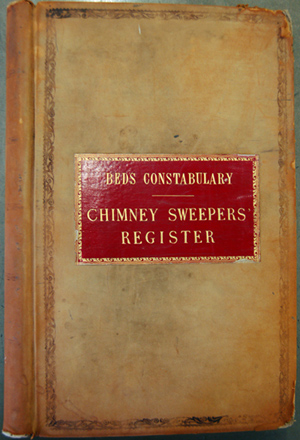
In February 1875 the death of another young boy started a campaign and in September another Chimney Sweepers Act was passed which finally put an end to the practice of sending boys up chimneys. Under this act sweepers had to be authorized by the police, which finally provided the means to enforce all previous legislation. QER20 is the Bedfordshire register of certificates granted under the act from 1876-1921. The first page has James Odell junr of Luton who is either Samuel Bates' employer or his son or grandson, but James unlike 1855 when we know that James Odell employed more than one boy he now declares that he doesn't employ anyone. [ref: QER20 p1]
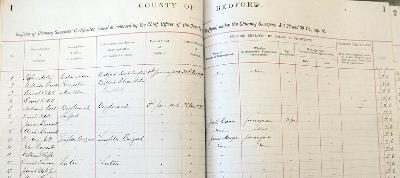
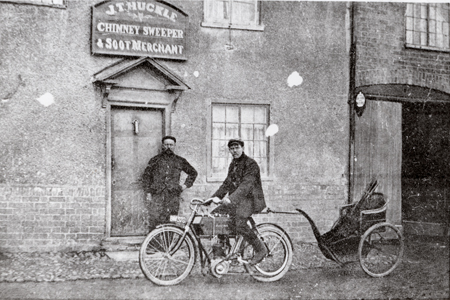
Z50/142/384 – Alfred Huckle, Biggleswade 1904 Mr. Huckle and his father, the only licensed chimney sweeps in the Biggleswade district at the time, used to sweep the chimneys in 17 villages and three towns and six mansions including Old Warden and Southill Park. This is the entry for Huckle in QER20:

And what of the ill-used Samuel Bates? A search of the gaol database tells us that by the age of 24 Samuel had 11 previous convictions for theft (8 in Bedfordshire and 3 in Hertfordshire) and he is removed to Millbank prison to complete a 12 month sentence. However, things start to look up as the year's go by and by 1891 he is working as a brick layer's labourer in Luton married to Emma, a hat sewer, and with a 10 year old daughter, Beatrice May.